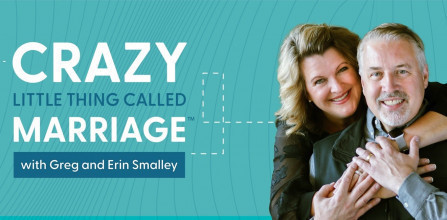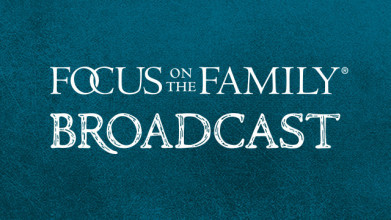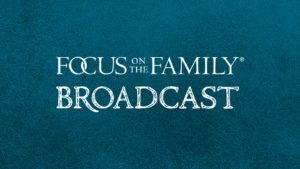Bob Lotich: And that’s wha- how we define true financial freedom. Like, it’s not just about the amount of dollars in your account. It’s not about, you know, whatever, livin’ the four workweek or being financially independent, but it’s about having that freedom to be content in Christ regardless of what the bank account says.
Linda: Mm-hmm.
John Fuller: That’s Bob Lotich, and he’s here with his wife Linda. And this is Focus on the Family, with your host Focus president and author, Jim Daly. I’m John Fuller.
Jim Daly: Uh, John, money can be a touchy subject for so many couples. I know from time to time, Jean and I will have our little, uh, dialogue. (laughs)
John: Is that what is is in your home? A dialog, I like that.
Jim: Our conflict is called dialogue. Uh, you know, not very often but it does pop up but it’s… You know, you look at the topics at Focus on the Family, uh, hears from people on and certainly finances, it’s right up there.
John: One of the top.
Jim: Yeah, one of the top. So today we’re gonna cover that. And I think I… Just to remind everybody, for me, it’s how to live a life that’s closer to Christ. Uh, that’s the goal. And money is a big deal.
John: Mm-hmm.
Jim: It’s mentioned a lot in the Bible, a lot. And so getting our, kind of, our emotions and our spirit around this topic of money, how we use it and how we bless others with it is really, really important.
John: Yeah, and we’re gonna hear a real inspirational and very practical story, uh, from Bob and Linda Lotich. Uh, Bob is a financial coach, and he and Linda share their best lessons. They’ve had over 50 million readers and listeners, uh, through their award-winning blog and podcast. Uh, Bob has written a book and Linda contributed. It’s called Simple Money, Rich Life: Achieve True Financial Freedom and Design a Life of Eternal Impact. And we’ll encourage you to stop by focusonthefamily.com/broadcast to learn more, or give us a call.
Jim: Bob and Linda, welcome to Focus. Good to have you.
Bob: We are honored to be here.
Linda Lotich: Yes.
Bob: Thanks very much, Jim.
Jim: That’s so great. Uh, Bob, your book starts off with a story about you being stranded.
Bob: Mm-hmm.
Jim: I love that.
Bob: Yep.
Jim: Everybody’s kinda dipping in now going stranded.
Linda: (laughs)
Jim: How’d you get stranded? And it led to this, I guess revelation about money.
Bob: Yeah.
Jim: How’d that work?
Bob: Yeah. So I was, uh, about 1000 miles from home, had $7 left on my bank account. I find myself driving down the road in a small Florida town. Car breaks down in which that was kinda of my… Yeah, turning point financially because basically, I realized, I gotta get to the bank to get my paycheck and to get it to my landlord. The rent was due that day. My paycheck was just enough to cover rent and so if I didn’t get it there by 5:00pm, they’re gonna charge me $50 late fee, which I didn’t have. Anyway, all this just kind of comes piling on my head. And I realized, “God, I need Your help.” And so I remember being in that car grabbing the steering wheel, tears rolling down my eyes, like, “I don’t know how I got here. I don’t know why I’m the financial mess that I am, but I need your grace to get out of it.” And that was what kick started my, uh, financial journey, I guess.
John: Mm-hmm.
Jim: Wow. That’s pretty dramatic. Now, we’re in college at this time. (laughs) Well, that says the-
Bob: Uh, so I was actually taking a year off of college-
Jim: Yeah.
Bob: … at that point. Um…
Jim: Yeah, that’s tough.
Bob: Yeah, yeah. So it was, uh, yeah, it was one of those moments where it was just turning point moment, and sometimes you get to that point where things get bad enough that’s like, “All right, I’m gonna cry to God. (laughs) Finally, I should have been on some long time ago, but I’m finally at this point where I’m gonna ask for help.”
Jim: No, it’s true. I, I don’t know why it always revolves around a car. My college-
Bob: Yeah.
Jim: … experience was similar. My Toyota Corolla back then-
Bob: Mm-hmm.
Jim: … (laughs) in front of my little room-
Linda: Oh my gosh.
Jim: … I was renting.
Bob: Yeah.
Jim: I’m going, “Okay, what do I do now?” And I didn’t have money to, you know, find-
Bob: Yeah.
Jim: … a way out.
Bob: Yeah.
Jim: So it’s amazing what the Lord uses-
Bob: Yeah.
Jim: … to get our attention.
Bob: Yeah.
Jim: You know, money management seems like something we should pick up from somebody, maybe our parents or maybe a course or two while you’re in high school-
Bob: Yeah.
Jim: … or somewhere.
Linda: Mm-hmm.
Jim: But so often, we don’t get that opportunity. Uh, or-
Bob: No.
Jim: … nobody takes the time to say, “Well, this is how you handle money.”
Bob: Well, no, it’s funny. I talk to parents all the time or fathers all the time, who say, “Yeah, we don’t, we don’t talk about money in our house.”
Jim: (laughs)
Bob: And I… And I’m like, “How are your kids going to learn? Like, how are they gonna learn?” Because again, like, the education system finally is starting to bring some stuff in a little bit more, but most people I know didn’t get any or much financial education there. And so what happens is we begin developing all of our financial beliefs from our broke friends, or from Instagram influencers, you know, even if they’re not like trying to teach us money lessons, like, how they behave is affecting our beliefs about money and how we behave.
Jim: Yeah.
Bob: And so we really need to turn to the Word of God and turn to the Bible to get these financial lessons to push out the bad ones, you know.
Jim: Mm-hmm. Absolutely. Uh, Linda, let me pull you in here a little bit.
Linda: Mm-hmm.
Jim: So was your background similar? Were you broke?
Linda: I…
Jim: (laughs)
Linda: Yeah, I was broke. I mean, mine was… It was kind of embarrassing because I was living in my parents’ house. I was making… You know, I was working a full time job and my parents were paying for everything, like my toothpaste, you know. I think I had a car payment and a cell phone bill and that was it.
Jim: Mm-hmm.
Linda: And I had a-
Jim: Good for you for taking care of those.
Linda: Right? Yeah.
Jim: A start.
Linda: Okay, I was starting just-
Jim: You know, start there.
Linda: Right. But I had a bill collector calling me because I was missing payments on my credit card-
Jim: (laughs)
Linda: … because I was so behind.
Jim: Oh no.
Linda: And they were calling my cell phone and you know, harassing me as they do. But they ended up calling my parents’ house phone.
Jim: Uh oh.
Linda: And the first time it they, you know, they called I, I answered it, and I was like, “Okay, well, I’ve talked to them now and they’re gonna leave me alone.”
Jim: Yeah (laughs)
Linda: I didn’t know. I was very naïve at that point.
Bob: They never leave you alone. (laughs)
Linda: They don’t leave you alone.
John: (laughs)
Jim: They just want talk to you.
Bob: Right. So-
Jim: “Hey, how you doing Linda? What’s happening in your life?”
Linda: (laughs) … so they call back the next day-
Jim: (laughs)
Linda: … when I’m actually at work and my mom answers the phone and I… You know, I come home and she says, “Well, I got a very interesting call today.” And I just-
Jim: Oh.
Linda: … You know, turned beet red, but I’m like, “Oh, Mom, it’s fine. I’ve got it taken care of.” But I was so embarrassed. I didn’t know how to ask for help. And I think I asked my brother to help me with a, a budget one time, but it wasn’t really until we got married that I was like, “Can you-
Jim: (laughs)
Linda: … please just take this and tell me what to do, so I don’t ever have to think about it again?”
Jim: I was gonna say… I was gonna cut away, “Bob, did you know this about Linda?”
Bob: (laughs)
Linda: (laughs)
Bob: No, we a- It’s funny. We actually had this meeting when we got engaged where she brought up-
Jim: A meeting?
Linda: A meeting.
Bob: Our financial meeting.
Jim: And you call that a meeting? I call that a date. (laughs)
Bob: So yeah, we’re, we’re-
Linda: It doesn’t really feel like a date. (laughs) What?
Jim: (laughs)
Linda: Sure.
Bob: How long was it after we got engaged?
Linda: It was not long.
Bob: It was pretty soon.
Linda: It was pretty soon.
Bob: And like, all right, we need to have the talk. “Let’s talk about our money, and because we’re bringing this together.” And she comes out with a shoebox and slide the shoebox across the table. And I opened it up and I’m like, “I don’t know what’s in here. It’s a… Maybe there’s a whole bunch of money and-
Linda: (laughs)
Bob: … like, maybe we’re independently wealthy already, you know.”
Jim: So the the shoebox is coming your direction?
Bob: So the shoebox comes my way.
Jim: I love the tension.
Bob: I take the lid of.
Linda: (laughs)
Bob: And in it are a ton of credit card statements. Some of them not even opened. And I’m like-
Linda: See?
Bob: … “All right, we got some work to do.” Like, and you know, and it-
Linda: We got a lot of work to do.
Jim: And that’s a good response.
Bob: Oh, yeah, like, I very much view this as we’re coming together and it was almost a blind leading the blind. I was, like, one step ahead of her. Like, it was, you know-
Jim: Yeah. But that…
Bob: … we’re both messes coming together.
Jim: How old were you? 20s right?
Linda: Yeah, early 20s.
Jim: Yeah.
Bob: Yeah, early 20s at this point. Yeah.
Jim: Yeah. Okay.
Bob: So-
Jim: That’s fair.
Bob: So, yeah.
Jim: So I, I just think that’s interesting that right, you could have said, “Oh, you know what? I’ve gotta go back home, uh, my mom called.” (laughs)
Bob: (laughs)
Linda: (laughs)
Jim: “Now that you showed me this special box of yours-
Bob: Yeah.
Linda: That’s the special box.
Bob: Yeah.
Jim: … that is all about the invoices that you’ve built up over the years.”
Bob: Yeah.
Linda: Mm-hmm.
Jim: How, how did you… How did you then… I mean, it’s pretty good trail to follow here.
Bob: Yeah.
Jim: So how did you get together on, “It’s okay, now that your debt is my debt, this is what we’re gonna do.”
Linda: Yeah.
Bob: Well, yeah, I think what you just said, like, that was the point that, um, I’m so thankful that we had the wisdom from others that this is a way to do it.
Jim: I’m glad.
Bob: You know.
Jim: I thought you’re gonna say, “Well, we signed a prenup.” (laughs)
Bob: (laughs)
Linda: (laughs) Well, fun fact, he actually had more debt than I did.
Bob: Yeah.
Jim: Okay. (laughs) Oh, you- way to move that one in.
Linda: So at least I had that going for me.
Jim: Yeah.
Bob: Yeah.
Jim: I love that save.
Linda: But that was about it though.
Bob: So we were nearly on equal playing field types-
Linda: Right.
Bob: … of debt, student loans-
Jim: Okay.
Bob: … whatever. But point is we just realized, “All right, we got a mountain in front of us, uh, We need to tackle this in Unity.” Like-
Jim: Mm-hmm.
Bob: … “Let’s be together on this and invite the Lord in, on it.” Um, and that’s… Yeah, we started moving forward from that point.
Jim: So to- i- in the book, you talked about a formula in-
Bob: Mm-hmm.
Jim: … you know, getting that formula going.
Bob: Yeah.
Jim: Sometimes, you know, we kind of discourage people thinking of parenting in a formula context.
Bob: Yeah.
Linda: Mm-hmm.
Jim: I- it obviously works with money.
Bob: Yeah.
Jim: You need, you need a plan.
Bob: Yeah.
Linda: Yeah.
Jim: So your formula kinda, uh, seems pretty obvious, “Save as much as you can.” What’s the other parts of the formula?
Bob: Yeah. Make all you can. Save all you can. Give all you can and then enjoy it all.
Linda: Mm-hmm.
Bob: And this we stole or borrowed a lot of it from John Wesley. John Wesley had a p- whole bunch of quotes kind of tie in this this concept of earning all you can, saving all you, and giving all you can. And I love it because John understood that he had his ability to preach and his ability to write to earn money while impacting the kingdom and then he could take that money that he earned to then give an impact the kingdom again. And, and I just love that he saw that. In the saving side, just because people always get this confused. It wasn’t necessarily just about saving in a bank account as much as you can. He meant reducing your expenses. Your unnecessary expenses, like, just not being insane with how you’re spending money.
Jim: In… I love that expression. In one chapter in your book, you talk about the AUM.
Bob: Yeah.
Jim: I love acronyms.
Bob: Mm-hmm. Yeah.
Jim: The AUM. (laughs)
Linda: (laughs)
Jim: But what is the AUM of A.U.M.?
Bob: Yeah, so a lot of people measure their financial progress with their net worth, you know, so, and…
Jim: Yeah.
Bob: I think a lot of people think, “Well, that’s just for rich people that count how much money they have and stuff like that.” But it’s actually a great way to measure your financial progress. But we have a little bit of an issue with the term net worth. Um, and so we just decid- decided we want to rename it and we want to call it AUM, uh, it stands for Assets Under Management. This is a common term among financial professionals to be able to say how much money I manage. And as believers, like, it just feels more appropriate if we understand that everything is God’s and everything in our bank account, our cars all of our possessions are actually His, uh, it feels better to me to call it our Assets Under Management.
Jim: Can I just say one observation?
Bob: Yeah.
Jim: In your 20s, it’s more liabilities under management. (laughs)
Bob: Yeah, absolutely.
Jim: When the number is… Got a little negative sign-
Bob: Yeah.
Jim: … in front of it, right?
Bob: Yeah, yeah.
Linda: That’s true.
Bob: And ours was negative the first time by a lot, negative 13,000-
Linda: Mm-hmm.
Bob: … when we first measured it. Um, but yeah, but that’s one reason. And the other thing, we don’t really like the idea of any number defining our net worth.
Jim: Mm-hmm.
Bob: If you will-
Jim: Yeah. Sure.
Linda: Yeah.
Bob: … like, when you consider everything that Jesus did for us-
Jim: Yeah.
Bob: … it’s like whether it’s 10 million-
Jim: Wow.
Bob: … or negative 10 million, like, defining yourself by that number just doesn’t sit right, you know.
Jim: But, in that context, I think the Lord’s clear to not be in debt to others is-
Bob: Yeah.
Jim: … f- I’d say a good spiritual-
Bob: Yeah.
Jim: … truth.
Bob: Yeah, absolutely.
Jim: Because you are beholden to that person you’re in debt to, right?
Linda: Mm-hmm.
Bob: Yeah.
Jim: Whether it’s the bank or whoever it might be.
Bob: Yeah.
Jim: Certainly not a relative. (laughs)
Bob: (laughs) Hope not.
John: Yeah.
Jim: But that is really good. And so that’s just your total assets minus your liabilities-
Bob: Yeah.
Jim: … basically, is what you have to manage and sometimes that’s negative and hopefully-
Bob: Yeah.
Jim: … it’s positive.
Bob: Yeah.
Jim: In that regard, uh, you also write about the Never 100 rule.
Bob: Mm-hmm.
Jim: So what, what is the Never 100?
Bob: Yeah.
Linda: It is to try as best as you can. Okay.
Bob: Yeah.
Jim: I love preface, thank you for that. It makes me want to do it.
Linda: Right. Not to spend a 100% of your income every month. So if you get, let’s just say a $100, for the sake of simplicity for me. (laughs)
Jim: Yeah.
Linda: Uh, if you get a $100 a month, try to put 10 of it into saving for retirement or something and then ideally, another 10 or whatever the Lord puts on your heart to give.
Jim: Right.
Linda: Right?
Bob: Mm-hmm.
Linda: And so then there’s 80% left or whatever that number is, um, to spend on your monthly expenses.
Jim: Yeah. And you’ve applied that over the years. You have something called the Straight A strategy kind of a…
Linda: Mm-hmm.
Jim: Is that a four part plan? If I remember correctly.
Linda: Yeah.
Bob: Yeah.
Jim: I’m hitting all the hotspots so, uh…
Linda: You are.
Jim: But people are gonna need to get the book, uh, to get it all.
Bob: Yeah.
Linda: Yes.
Bob: Yeah, the thing about the Never 100 rule that… It was just a rule that we created, we realized that if we keep spending 100% of our income, we’re never gonna go forward.
Jim: Correct.
Bob: And that’s what we were doing.
Linda: I, I was actually spending 150% of my income.
Bob: Mm-hmm.
Jim: Yeah. No, that’s fair.
Linda: So that was putting…
Bob: So-
Linda: That’s what got me into debt and had debt collectors calling me, right?
Jim: Yeah.
Linda: So this was a rule we needed to break in order to rein things in and-
Bob: Yeah. And so that’s where that rule came from. It’s like, “How can we make a rule that ensures that we’re going to move forward financially by giving and by saving or investing or whatever?” And so the Straight A strategy was kinda birthed out of that, “What are the things that we can do?” Because like, everyone knows, “All right, don’t spend all your money.” Like, that’s obvious. But how do we actually do that? And that’s where the Straight A strategy comes into play. And so the first one is paying attention. Like, we have to actually pay attention and you’d be surprised how many people don’t do this.
Jim: I wouldn’t be surprised actually, I know myself. (laughs)
Bob: (laughs)
Linda: (laughs)
Bob: So yeah.
Jim: You start with the toughest discipline of all, pay attention. Okay.
Bob: Yeah.
Jim: What’s next?
Bob: And, and the next part is to, um, actually find some way to have some accountability. Like, we all know this. We need some accountability. We need some sort of budget that’s actually gonna hold us accountable. And, and the next one is automating everything that you can, because what I’ve discovered is, uh, the truly financially successful people in the world, they don’t depend on their willpower. So everybody thinks that they’re doing well financially because they have so much willpower and they can just do the right thing all the time. It’s not that.
Jim: What is-
Bob: They learned how to automate.
Jim: Yeah, what does automate mean? Like, what does it mean?
Bob: Yeah, it means making it automatic. So if it’s giving and you’re not consistent with giving, but you wanna be a consistent giver, like, how can you set it up so that you’re automatically giving to your church or whatever organization you want every month? Or if it’s saving for retirement.
Jim: Like an auto Bill Pay kind of thing?
Bob: Yeah, it could be that.
Jim: Mm-hmm.
Bob: Or just, um, with your HR department setting up an auto 401k contribution every single month or contributing to an IRA. But doing those things automatically is really how you make the progress.
Jim: Yeah. No, that’s good. Those are good principles. Linda, m- most of us have credit cards, you’ve alluded to your (laughs) struggle with credit cards.
Linda: (laughs)
Jim: And I so appreciate that. Thank you-
Linda: Yes.
Jim: … for that vulnerability. But w- what rules, uh, have you put in place to master them and they don’t master card you?
Linda: Yes, I know. I- it’s a tricky one. So one of the things that we did was we decided, um, we weren’t going to use it for fun money, ever. So if-
Jim: Okay.
Linda: … we were using a credit card, it was going to be for an electric bill, which we’d have no, um, temptation to overspend on, right? So we’ll use them for things like that. And s- some of the reason we do that is to kinda work the point system.
Jim: Sure, sure.
Linda: You know, but, um, the other thing we did is if we ever carry a balance over to the next month, we shut it down immediately.
Jim: Mm-hmm.
Linda: Um, because we know ourselves well enough to know that if it’s like, “Oh, well, we’ll just kick that can down the road.” It’s too easy to just keep kicking it down the road. (laughs)
Bob: Yeah.
Jim: Yeah. And the principle there is to pay it off every month.
Bob: Yeah.
Linda: Every month.
Jim: Yeah, Jean and I try to do that.
Bob: Mm-hmm.
Linda: Yeah, so that- that’s big. Is there a different one?
Bob: Yeah. And then, and then last one is really just if you’re going to use a credit card at all, um, just make it work for you.
Linda: Yes.
Bob: Because I think what most people don’t realize is the difference between a good credit card and a great credit card in terms of rewards generated things. It’s, it’s not like twice as good. It’s like five or 10 times as good. So just getting credit card because they offered you a free T-shirt, like, it’s not the way to go.
Jim: (laughs) No, that’s funny. I never thought of MasterCard that way. You could preface it as we are your master-
Bob: Yeah. Mm-hmm. (laughs)
Jim: … card. (laughs)
Linda: Yes.
Bob: Yeah.
Jim: I mean, that’s scary actually.
Linda: It is scary.
Jim: You don’t wanna get into that debt. Boy, I’ve tried to teach my, my 20 something boys to be-
Linda: Mm-hmm.
Jim: … cautious about that.
Bob: Yeah.
Jim: And I think they’ve managed it-
John: Mm-hmm.
Jim: … good so far, but we’ll-
Linda: That’s good.
Jim: … we’ll continue to-
Bob: Yeah.
Jim: … monitor.
Linda: (laughs)
Jim: Um, the second part of your formula is to earn all you can, but what can you do if you’re stuck in a low paying job? Pretty practical question, you know.
Bob: Yeah.
Jim: When you look at that 100% approach-
Linda: Mm-hmm.
Jim: … if you’re literally making a few $100s a month-
Linda: Yeah.
Jim: … i- it’s hard to find margin in there-
Linda: Mm-hmm.
Jim: … to put in savings-
Bob: Yeah.
Jim: … and to tithe. And I get the principle but let’s be practical.
Linda: Yeah.
Jim: Um, what do you do if you’re in a lower paying job and it seems to take a 110% of your money to just pay your bills, your insurance?
Linda: Mm-hmm.
Jim: Have you seen the cost of things lately?
Linda: Oh, my gosh.
Jim: It’s like crazy.
Linda: Yeah.
Jim: I feel so bad for people on the lower end of the income spectrum when eggs are $6-
Bob: Yeah.
Jim: … a dozen.
Linda: Mm-hmm.
Jim: You know what we’re feeling.
Bob: Yeah.
Linda: Right.
Jim: So what do you do?
Bob: Yeah, I mean, I think the biggest thing, uh, you know, and this is obvious, but it’s like you start with going to God.
Linda: Mm-hmm.
Bob: We bring him into the equation, ’cause I think this is one of the unfair advantages that we have as believers is we have the opportunity to invite the God of the universe into our financial situations. And when we’re not taking advantage of that we’re missing out on a lot of opportunities. Um, in terms of getting practical with this. Um, you know, we haven’t successfully followed the Never 100 rule every single month of our lives, but we’ve done everything that we can. And so i- literally, if we’re making 10,000 a month or 1000 or 100, um, I really just want to be giving something out of that every single time. And, um, and that would be my encouragement, you know, ’cause even if you’re only making $100 in a given month, that’s not gonna solve the problem anyway.
Jim: Right.
Linda: Mm-hmm.
Bob: And so there’s something about that seed time principle-
Jim: Mm-hmm.
Bob: … of like, just giving-
Jim: Mm-hmm.
Bob: … first even when it’s not comfortable, even when it doesn’t make sense.
Linda: Mm-hmm.
Bob: That like, we encourage people to do.
Jim: Yeah.
Bob: You know.
Jim: No, that’s really good.
Linda: Yeah.
John: This is Focus on the Family with Jim Daly and our guests today are Bob and Linda Lotich. And, uh, we’re so glad for their story, for their, uh,… Frankly their transparency about their own struggles. We’ve all had financial struggles. Uh, they have some terrific principles in a book that Bob has written, Linda contributed. It’s called Simple Money, Rich Life: Achieve True Financial Freedom and Design a Life of Eternal Impact. Love the emphasis of that and I would encourage you to stop by focusonthefamily.com/broadcast to get your copy or give us a call. 800, the letter A and the word FAMILY.
Jim: Uh, the third part of your formula is to give all you can. I mean, as Christians we want to do that, but sometimes it’s hard like we’ve said.
Bob: Mm-hmm.
Jim: Um, you know, I think the national survey data shows that. I think Christians may give somewhere around 3 to 5%.
Bob: Yeah.
Linda: No.
Jim: I don’t think it’s near 10%, the tithe as we call it.
Linda: Mm-hmm.
Bob: Yeah.
Jim: But and then some, you know, you’re you’re tithing off the net, not the gross.
Bob: Mm-hmm.
Jim: All those-
Linda: Yeah.
Bob: Yeah.
Jim: … theological debates.
Bob: Yeah.
Jim: Bob, you had a great, uh, experience at a church, I think with a part-time pastor or a temporary pastor who got some point across to you. What was it?
Linda: (laughs)
Bob: Yeah, so, uh-
Linda: Was it great experience? (laughs)
Bob: Yeah.
Jim: Was that a great experience?
Bob: No, I was, I was at this church, I mean is actually down in Florida, when my car broke down that whole story. And a small little church, 70 people and they brought in a guest preacher for the weekend. And, um, anyway, and he was preaching his message in the middle of it just like stops and he’s like, “Who here isn’t tithing?” And, and it’s small church.
Jim: (laughs)
Bob: And we’re like… Everybody’s looking around, like, “Uhh, do I have to answer that?” And kind of that was a rhetorical question. And he’s just like, asked it again.
Jim: He was waiting?
Bob: And waiting for an answer.
John: Who isn’t tithing? Let’s find them.
Bob: And, you know, I’m a new Christian at this point. I’m like, is this normal? Like, I, I have no idea, you know. And, uh, in any way and so time goes by and I’m like trying to crawl out it under the seat. Like, I just… So awkward in this room. And finally, two guys raise their hand real sheepishly and then he calls them down to the front, publicly berates them in front of the rest of us, um, and then sends them back to the seat and just goes on his way. And anyway, and it was just a moment where I’m like, “God, is this normal? Is this what it’s supposed to be?”
Linda: Mm-hm.
Bob: Like, is… “I thought there was something about us being cheerful givers that you liked?” And, um, this didn’t feel like that to me.
Jim: (laughs)
Bob: You know.
Jim: No, it got the point across. (laughs)
Linda: Yeah.
Jim: That’s not the experience you want to have-
Bob: Yeah.
Linda: Right.
Jim: … certainly as a new believer-
Bob: Yeah.
Jim: … in Christ, and then the pastor that would do that. Now here- here’s probably the question or the comment that I really have been chomping at the bit to get to you guys.
Linda: Oh.
Jim: Because I’m thinking of you starting your life with at least 13,000 in debt.
Linda: Uh-huh.
Bob: Yeah.
Jim: And then working your way through the 20s. But you had a goal that you set, that you try to give away a million dollars by the time you’re 40.
Linda: Mm-hmm.
Bob: Yeah.
Jim: That’s pretty bold.
Linda: (laughs)
Jim: And I wanna hear… No, it’s true. I mean, I’m just sitting-
Linda: Yeah.
Jim: … here going, “You’re in your early 20s and you got all this debt (laughs) and you got people calling your house.
Linda: Uh-huh.
Jim: You get married and you say, “Okay, by the time we’re 40, let’s give away a million dollars.”
Linda: Yeah.
Bob: Yeah.
Jim: And I’m sitting here going, what?
John: Mm-hmm.
Jim: So how… What did that look like? And did you actually achieve it?
Bob: Yeah, so I’ll start with… Where this whole thing kinda came from for me is I… After we paid off all our credit cards, all we had left was our mortgage. Okay, which most people are like, “That’s amazing. All you had to pay was a mortgage.” And I remember going to pray to God and ask Him to help get our mortgage paid off faster.
Linda: Mm-hmm.
Bob: You know, like we had a plan, it was gonna take us three or four years, which is again, fantastic. Anybody listening is like, “If I could pay off my mortgage in three years, that’d be amazing.” Um, but I… I’m an American. I want it faster.
Linda: (laughs)
Jim: (laughs)
Bob: So I was praying to God and asking that. And I remember, like, one of the clearest things He’s ever dropped in my heart. And I felt like He spoke to my heart and said, “If you really wanna see me move on your finances, I want you to begin giving your age as a percentage of your income.” And-
Jim: Oh wow.
Bob: … and at that point, I’m standing in a field praying, I like, looked up to heaven, scratch my head. I’m like, “What is that? I’ve never heard of that. There’s no way that idea just came from my mind.” Like, that’s not what I wanted to do. I’m gonna race to pay off my mortgage. And so I start wrestling with this a little bit and doing math. I’m like, “I don’t even know if we can pay, buy groceries if we do this. We’re definitely not gonna pay off our mortgage for a long time if we did this.” All this to say, so I go back and talk to Linda, and she gets on board.
Jim: (laughs) Good for you.
John: Wow.
Jim: Good for you.
Linda: Well, you know, the thing about this story is that we had actually been through this before. This sounds a whole lot like another story we have when we were trying to pay off our credit card debt initially. Almost identical. And it wasn’t the give your age as a percentage, but it was a… We were giving 10% at the time and it felt a li- I felt like the Lord was saying give an additional 10%. And we had seen the faithfulness of God and the miraculous happened in that situation-
Jim: Hmm.
Linda: … to where we got our debt paid off so much quicker than it should have been.
Jim: Wow.
Linda: Like, even in our… With our best laid plans, like, it got paid off quicker than that even.
Bob: Yeah.
Jim: Yeah.
Linda: And so when he comes and says this to me, I thought, “Well, we could give it a shot.”
Jim: (laughs)
Linda: Like, “There’s nothing that saying we have to do this for the rest of our lives-
Bob: Yeah.
Linda: … but if you feel like this is what the Lord is asking us to do. What if we try it for three months and just see what happens-
Bob: Mm-hmm.
Linda: … if the money is there for us to even continue doing this.”
Jim: One of the great theological point is that the Lord is asking you to do it, then you’re gonna see something happen.
Bob: Yeah.
Linda: Right.
Jim: Was your point. Right?
Bob: Absolutely.
Linda: Exactly.
Jim: And you obviously saw stuff happen.
Linda: Right. Yeah.
Jim: ‘Cause it went further than three months. Right? So…
Linda: Went further than three months.
Bob: Yeah, we keep… We started doing that that month. And really, it felt like laying down our goal of paying off the mortgage on the altar.
Jim: Mm-hmm.
Bob: It’s ’cause I did the math. I’m the money nerd and I go back and I’m like, “All right, well, it’s gonna take us 12 years or 10 years or something to pay half the mortgage now if we give all of our extra money away,” which is pretty much what we did. And the most amazing thing is that nine months later, our mortgage was paid off.
Jim: Wow.
Bob: And it makes no sense.
Linda: Nine months.
Bob: It doesn’t… It’s like still to this day, like I can’t tell you exactly how it happened because I don’t know. It was just one of those crazy things that God did-
Linda: Mm-hmm.
Bob: … that he invited us on. And so, um, pulling all this back to the, this big goal, like that’s, that was a significant part because as we were giving our age over all those years, 31%, 32%, 33%, I guess a lot of money each year, um, and it began to add up and yeah, by the age 39 and about eight months, like, we crossed the $1 million dollar mark. And we gave each other big high five.
Linda: (laughs)
Jim: That’s amazing.
Bob: And yeah, and just celebrating what God did.
Linda: Right.
Bob: ‘Cause we know where we came from.
Jim: Gave each other a high-five, and said, “We’d like to go out to dinner but we can’t afford it.” (laughs)
Linda: (laughs)
Bob: So okay, so this is what’s-
Linda: No but-
Bob: … so interesting. I gotta share this.
Linda: Yeah.
Bob: Like, so back to the AUM we were talking about-
Jim: Yeah.
Bob: … before, like you would think that as we’re giving away all this money, such a significant amount that our AUM would just go down-
Jim: Right.
Bob: … because we’re giving it away. But-
Jim: You’re giving away your assets.
Bob: … but here’s the thing, and we have an image of this in the book, we have a chart showing our AUM and our giving, going up in lockstep with each other. So as we’ve continued to increase our giving, our AUM just went along right with it.
Jim: Yeah.
Bob: So it’s like, God’s math is not like the worlds’ math.
Linda: It, it doesn’t make sense.
Jim: I was just gonna say that. God profounds us-
Bob: Yeah.
Jim: … with his math, which-
Linda: Oh yeah.
Jim: … is different from our math.
Linda: Mm-hmm.
Bob: Yeah.
Jim: And that’s the point. Let’s end here. Uh, this has gone by, uh, I hope people can take elements of this. I hope they get the book that’s… It goes into so much more detail.
Linda: Yeah.
Jim: And-
Bob: Yeah.
Jim: … what a fun way to actually approach a very difficult subject.
Linda: Mm-hmm.
Bob: Yeah.
Jim: And I’m so glad you guys made it through the rough years in your 20s. What is the hardest financial habit to break and how can we overcome it?
Bob: Yeah.
Jim: So let’s end there with people that are, you know, $13,000, $15,000, $20,000 in debt-
Linda: Mm-hmm.
Jim: … thinking, “Wow, how do I get out of the hole?”
Linda: Yeah.
Bob: Yeah. For me, you know, and it may not be this for everyone, but for me, it was the habit of discontent. Like, that was the thing-
Jim: Mm-hmm.
Bob: … that was driving all of our problems. This is why we had to create the Never 100 rule because both of us-
Linda: Right.
Bob: … were discontented with our spending. And that’s not everyone’s situation. Some people are just dealt really difficult financial situations. It’s not about their overspending per se.
Jim: But for the most part, I bet most people fit into that discontent category.
Bob: Yeah.
Linda: Mm-hmm.
Bob: I mean, we live in a world-
Jim: Yeah.
Bob: .. that just breeds everything around us, you know.
Jim: Well, I wanted to say that we spend more than we make and that’s not gonna get you anywhere.
Linda: Right.
Bob: Yeah.
Jim: So.
Bob: And so that, that was a big thing for me, like, learning how to, uh, just truly be content with what God has given me and coming back to Philippians 4, where Paul talks about learning how to abase and abound in the high times and the low times, like, in being content in whatever the situation is. Like, there’s something there that I’ve always wanted. And that’s how we define true financial freedom.
Jim: Mm-hmm.
Bob: Like, it’s not just about the amount of dollars in your account. It’s not about you know, whatever, live in the four week… Workweek or being financially independent, but it’s about having that freedom to be content in Christ regardless of what the bank account says.
Linda: Mm-hmm.
Jim: Man, that is so good.
Linda: Yeah.
Jim: Man, I hope you’re hearing the heart of our guests, Bob and Linda and the great book, they’ve written Simple Money, Rich Life. I wish I would have heard this in my 20s-
Bob: Yeah.
Jim: … to be honest with you, I think it would have changed some of the things that, uh, Jean and I have done and-
Linda: Us too.
Jim: … what a great challenge.
Bob: Us too.
Jim: You know. Yeah, but have fun and maybe, uh, you know, maybe you have adult kids that need to see this. Just handle that discreetly.
Bob: Yeah.
Jim: Uh, or maybe you’re in you’re 20s and 30s and thinking, “Wow, this may be a fun way to approach life.”
Linda: Mm-hmm.
Jim: But the bottom line is get in touch with us. If you can, you know, donate and be part of the ministry here, we’ll send it as our way of saying thank you for your participation.
Bob: Mm-hmm.
Jim: That’s a great way to do it. Be a monthly giver. It could be $10, $15 a month. Back to your 10%.
Bob: Yeah.
Linda: Yeah.
Jim: Yeah, and, uh, that way we’re helping others and we’re not giving money to shareholders from some other company-
Bob: Mm-hmm.
Jim: … (laughs) is the better way to do it ’cause the money goes back to helping families thrive in Christ. Why not do it that way?
John: Mm-hmm. Yeah, we invite you to automate as Bob said-
Jim: (laughs)
Bob: Yeah.
John: … and become a monthly sustainer.
Jim: That’s what I do.
John: Um, that is a tremendous way to donate to the ministry on an ongoing basis. It really evens things out for us here. And we’d invite you to be a sustainer on a monthly basis. We recognize not everybody can do that. So, uh, either, uh, contribute monthly or make a one-time contribution to the work here at Focus on the Family, help us reach families around the world. And when you do, we’ll send a copy of Simple Money, Rich Life: Achieve True Financial Freedom and Design a Life of Eternal Impact. Terrific resource. Again, our number is 800 the letter A and the word FAMILY or you’ll find all the details and focusonthefamily.com/broadcast.
Jim: Bob and Linda, great to have you with us the first time and it’s been wonderful to meet you and-
Bob: Yeah.
Jim: … thanks for making the, the trek from Nashville to be here.
Bob: Oh yeah.
Linda: Absolutely.
Bob: Yeah, it’s our pleasure. Thank you so much for having us.
Linda: Yes.
John: And thank you for joining us today for Focus on the Family. On behalf of Jim Daly and the entire team, I’m John Fuller, inviting you back as we once again help you and your family thrive in Christ.




















